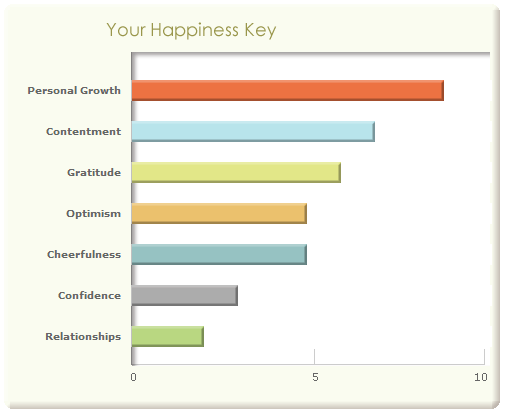Tests Results
- Your Sexual Persona
- Your Personality Type
- Your 5 Factor Personality Report
- The Brain Test
- Emodes Original Inkblot Test
- Comprehensive IQ Report
- Career Interest
- Your Chakra Reading
- Your Emocional IQ Report
- What's Behind Your Emotions?
- Your Enneagram Report
- Your Motivation Report
- Your Picture Personality Report
- Your Plan for Happiness Report
- Your Destity Reading
- The Best Qualites Report
- Your Career Interest Report
- Your Freudian Analisis Report
- Your 7 Secrets of Success Report
- Your Career Personality Type Report
- Your Corporate Culture Report
- Fear Report
- Your Multiple Intelligences Report
- Your Picture Personlity Report
- Your Power Quotient Report
- Your Social Networking Report
- Your Subconscious Mind Analysis
- Your Super IQ Report
- Your True Talent Report
- Your Right Job Report
Who excuse his actions by destiny and indulge yourself, this deserves to make mistakes.
Cum sociis natoque
— Seneca the Younger,
Lucius Annaeus Seneca, called Philosopher,
(4 BC - 65 AD)
Motto
Almost anyone fate did not bestow great and continual success. Only the happiness that comes easily, is persistent and accompanied us to the end. Seneca the Younger (born Lucius Annaeus Seneca, called. Philosopher, 4 BC - 65 AD)
Your Plan for Happiness Report
Rafal, currently your happiness baseline is 52, which is higher than 38 percent of the other people who took The Happiness Test. What this baseline means is that, taking both your high and low moods into account, your range of happiness, tends to be around this level.

As most of us know from first-hand experience, happiness is a changeable thing. In fact, you've probably felt your own overall happiness level shift from year to year, month to month, or even day to day. It's natural to experience highs and lows at different moments in your life. If you expect to feel the happiest of happy all of the time, you'll probably be disappointed. However, you can strive to elevate your baseline of happiness, so that the lows you experience are not as low, and the highs you experience are even higher.
A person's overall level of happiness is more consistent than an individual mood or passing feeling. Your baseline for happiness provides a kind of foundation for your emotions and experiences to rest upon. Because of this fact, if you retake The Happiness Test after some time has passed, your results may be dramatically different. This can be especially true if you take time to learn more about the nature of your own personal happiness patterns and apply the strategies suggested within this report. The material that follows will discuss specific ways you can achieve a shift in your happiness baseline, as well as altering the particular aspects that affect it.
Currently, your results indicate that your happiness baseline is within the average range. This means that most people are just about as happy as you are. Even though this may feel comforting, that doesn't mean you shouldn't strive to be even happier. By gaining a better understanding of what makes up your happiness, you can learn to direct your energies to the areas that you may be neglecting.

As you now know, your contentment has a positive effect on your overall happiness. However, your greatest source of happiness is your commitment to personal growth. Personal growth is a dedication to being the best that you can be. When you're empowered by personal growth, you tend to view your life as a glorious work in progress. You're also likely to put effort toward exploring what life has to offer you, because you have strong sense of purpose that acts as your guide. This faith and focus helps you feel capable that you can change things for the better.
Being actively directed toward exploring your place in the world is where your happiness springs from most. It's also the place where your happiness gains the most power and stability. Because this personal growth appears to be the natural anchor point for your happiness, know that you can always tap into this aspect of yourself when times get rough.
For instance, like you, Meredith is a person who is usually very committed to personal growth. She's particularly proud of the weight loss and body sculpting she's achieved through a five-year health regimen that she developed for herself. However, as happens in everyone's life at one time or another, Meredith recently faced a setback. She became ill for a period of time and was unable to continue her strenuous health routine. As a result, she began to gain weight and lose the muscle tone she had worked so hard for. This made Meredith feel awful about herself. She even became a bit depressed. However, Meredith was not wrong to feel sad or frustrated. These were natural emotional reactions to such an event. It is simply not realistic or even possible to be happy all of the time.
In Meredith's case, after a short period of feeling down, she decided that it was time to find alternative methods for health and move toward her own happiness again. It felt strange trying to be happy at first, because the illness and her feelings about it had taken over so much of her life. She didn't know exactly how to motivate herself again. But over time, Meredith naturally began to gravitate toward her personal growth skills. She remembered how out of shape she'd been five years ago and how far she was able to come just on the power of her will. With this boost of confidence, she began to think about how she could take control of her present situation. She also thought about places she could turn for help in meeting her new goals. Soon Meredith had shifted herself back into a place where she felt able and happy. Her resilience and positivity in the face of a difficult situation is a great model for your own life.
There is real power in being committed to personal growth. Focusing yourself this way allows you to steadily improve your life and tackle any obstacles that might appear in your path. It also helps you feel a greater sense of control in your relationships and the world around you. Through personal growth, you can nurture your spirit and build personal resources including willpower, strength, and focus. These can be valuable assets to draw upon in less happy times.
Just like a living thing, your happiness will stay its most strong and robust with proper feeding. In other words, you have to regularly think thoughts and take actions that support being happy. Your test responses indicate that you feed your happiness by being particularly committed to personal growth. More than most people, you truly know how to focus on a goal toward personal change. It seems natural for you to think about who and what you want to be. Ordinarily, you simply set a course of action and follow through. This skill is probably the result of lots of positive reinforcement, perhaps even dating back to your childhood. For example, you may have had a parent or role model who was highly focused in their own right and taught you that you can grow through knowing yourself better. If you received such a lesson, it was a tremendous gift that you're still putting to good use today.
Is there a key to happiness? In fact, there may be many. Take a look at your scores for the seven major areas that contribute to happiness. You'll be able to see which ones are currently contributing most to your happiness and which may need more attention. By continuing to make the most of your strong areas and shoring up the weaker ones, over time you can be sure to experience an increase in the happiness you feel.
